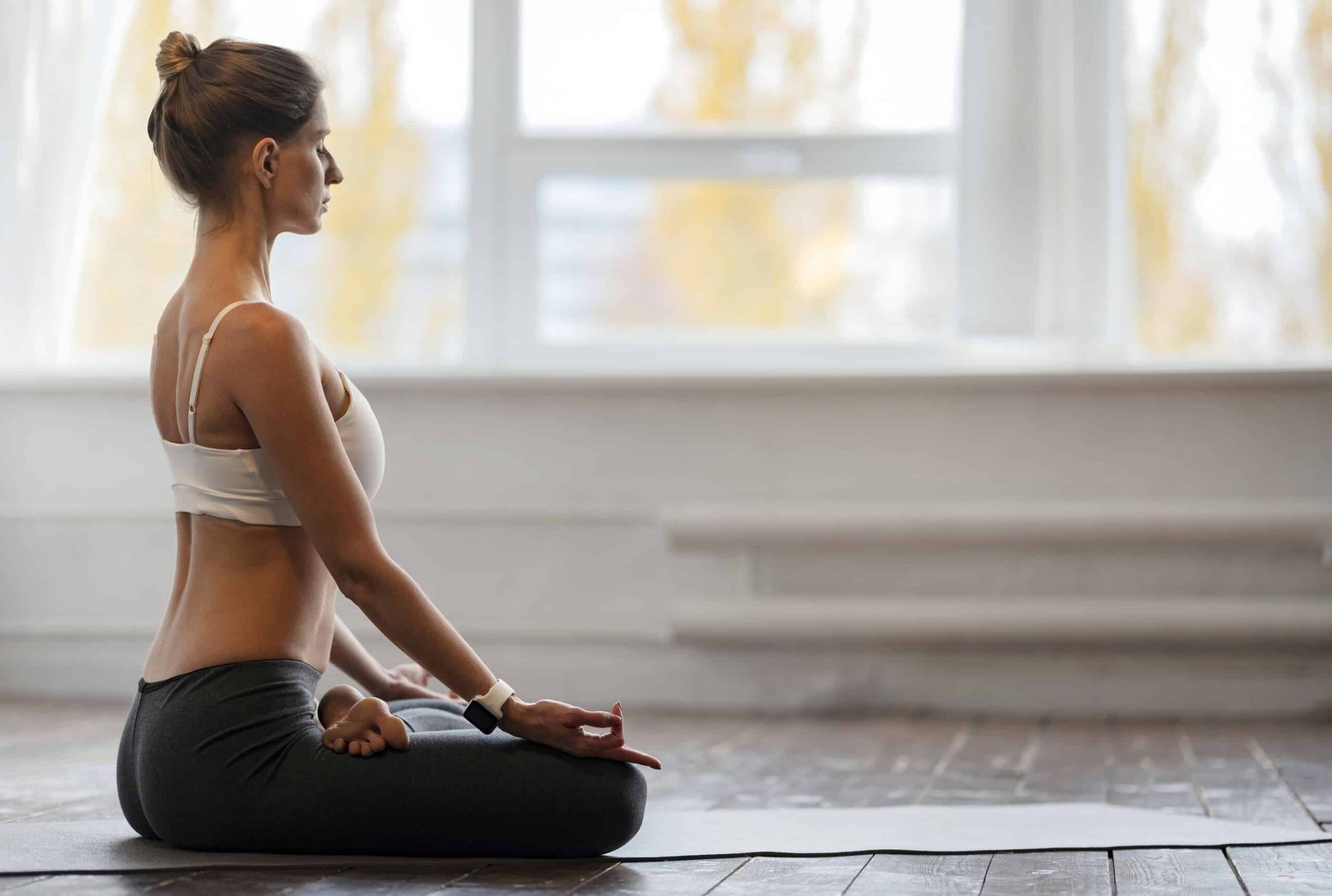In the pursuit of mental health and overall wellness, morning routines emerge as a potent tool, particularly when intertwined with the practice of yoga. Let’s explore the scientific underpinnings of morning rituals and delve into how integrating yoga into these routines can significantly benefit mental health and wellbeing.
Understanding the Science
Regulating Cortisol Levels
Balancing cortisol levels is paramount for overall wellbeing, as this hormone influences various bodily functions, including stress response. Morning routines, particularly those integrating yoga practices, offer an effective means to regulate cortisol levels and promote mental and physical equilibrium.
Cortisol, often dubbed the “stress hormone,” plays a crucial role in the body’s fight-or-flight response. However, chronic stress or elevated cortisol levels can lead to adverse health effects, including anxiety, depression, and impaired immune function. Therefore, maintaining cortisol levels within a healthy range is essential for optimal health and wellbeing.
Yoga, with its emphasis on mindful movement and breath control, has been shown to be particularly effective in modulating cortisol levels. Gentle yoga poses, combined with deep breathing exercises, help activate the parasympathetic nervous system, which counteracts the body’s stress response and promotes relaxation.
By incorporating yoga into morning routines, individuals can start their day on a positive note, setting the tone for reduced stress and enhanced wellbeing. Even just a few minutes of yoga practice each morning can have significant benefits in regulating cortisol levels and promoting a sense of calmness and balance.
Moreover, the benefits of cortisol regulation extend beyond mental health to physical health as well. Balanced cortisol levels support immune function, digestion, and metabolism, contributing to overall vitality and resilience.
Integrating yoga into morning routines offers a powerful strategy for regulating cortisol levels and promoting mental and physical wellbeing. By prioritizing practices that nurture relaxation and balance, individuals can cultivate a healthy stress response and lay the foundation for a vibrant and fulfilling life.
Release of Neurotransmitters
Understanding the intricate mechanisms of neurotransmitter release sheds light on how morning routines, particularly those incorporating yoga, contribute to mental health and overall wellbeing.
Neurotransmitters such as serotonin and dopamine are essential chemical messengers that play a fundamental role in regulating mood, cognition, and overall brain function. Their release is influenced by various factors, including physical activity and stress levels.
Engaging in morning activities, especially yoga, can stimulate the production and release of these neurotransmitters, leading to improved mood, increased focus, and a heightened sense of wellbeing throughout the day.
Yoga practices, with their emphasis on mindful movement and breath awareness, have been found to have a profound impact on neurotransmitter activity. As individuals move through yoga postures and practice deep breathing exercises, they activate neural pathways associated with the release of serotonin and dopamine, often referred to as “feel-good” chemicals.
Furthermore, the meditative aspects of yoga promote a state of relaxation and tranquility, further enhancing neurotransmitter release and fostering a positive mental state.
By incorporating yoga into morning routines, individuals can harness the power of neurotransmitters to elevate mood and enhance mental wellbeing. Even a short yoga session in the morning can have lasting effects, setting the stage for a productive and fulfilling day ahead.
Understanding the role of neurotransmitters in mental health underscores the importance of morning routines, particularly those that include yoga practices. By promoting the release of serotonin and dopamine, yoga offers a natural and holistic approach to enhancing mood and supporting overall wellbeing.
Yoga Benefits for Mental Health
Fostering Mind-Body Connection
Exploring the profound link between the mind and body unveils the transformative potential of morning routines, especially those enriched with yoga practices, in promoting mental clarity and overall wellbeing.
Yoga, with its holistic approach, emphasizes the interconnectedness of physical movement, breath awareness, and mental focus. Through the deliberate practice of yoga postures (asanas) and breath control (pranayama), individuals cultivate a deep sense of mindfulness and presence, fostering a harmonious relationship between mind and body.
The integration of mindful movement and conscious breathing in yoga serves as a powerful tool for reducing stress and promoting relaxation. By synchronizing breath with movement, practitioners enhance their ability to stay grounded in the present moment, thereby alleviating anxiety and promoting mental clarity.
Moreover, yoga encourages individuals to tune into bodily sensations and internal cues, fostering a greater awareness of physical and emotional states. This heightened sense of self-awareness enables individuals to recognize and address stressors more effectively, leading to improved emotional regulation and overall resilience.
Through regular practice, yoga cultivates a profound sense of connection with oneself and the surrounding environment, promoting a deeper understanding of one’s inner workings and fostering a sense of inner peace and balance.
By incorporating yoga into morning routines, individuals can tap into the innate wisdom of their bodies and minds, setting a positive tone for the day ahead. Whether through a brief meditation, gentle stretching, or mindful breathing exercises, dedicating time to nourish the mind-body connection in the morning lays the foundation for a day filled with clarity, presence, and vitality.
Reduction of Stress
The reduction of stress stands as a cornerstone benefit of morning routines infused with yoga, offering individuals a potent tool for cultivating inner calm and resilience in the face of life’s challenges.
Yoga’s holistic approach addresses stress on multiple levels, encompassing physical, mental, and emotional dimensions. Through a combination of gentle movement, breath awareness, and mindfulness practices, yoga promotes relaxation and releases tension stored in the body, thereby alleviating physical manifestations of stress such as muscle tightness and fatigue.
Moreover, yoga serves as a powerful antidote to the mental and emotional toll of stress. The meditative aspects of yoga encourage individuals to cultivate present-moment awareness, fostering a shift from rumination and worry to a state of calm observation. By focusing on the breath and anchoring attention in the present, practitioners can quiet the mind and cultivate a sense of inner peace, even amidst life’s chaos.
Furthermore, the rhythmic and mindful movements of yoga activate the parasympathetic nervous system, triggering the body’s relaxation response. This physiological shift leads to a decrease in heart rate, blood pressure, and cortisol levels—the primary stress hormone—resulting in a profound sense of relaxation and wellbeing.
Incorporating yoga into morning routines provides individuals with a proactive approach to managing stress, equipping them with tools to navigate the inevitable ups and downs of daily life with greater ease and resilience. Whether through a brief yoga sequence, meditation, or breathwork exercises, dedicating time to self-care in the morning sets a positive tone for the day ahead, empowering individuals to approach challenges from a place of groundedness and inner strength.
Improved Sleep Quality
Improving sleep quality is a pivotal aspect of mental health and overall wellbeing, and integrating morning yoga into daily routines offers a promising avenue for achieving restful and rejuvenating sleep.
The calming and centering effects of yoga can have a profound impact on sleep patterns, setting the stage for a more peaceful and uninterrupted night’s rest. By engaging in gentle yoga postures and relaxation techniques in the morning, individuals can effectively regulate their body’s internal clock and promote a sense of balance in their sleep-wake cycle.
Yoga’s emphasis on breath awareness and mindful movement helps to alleviate tension and stress accumulated throughout the day, preparing the body and mind for deep relaxation when bedtime approaches. Moreover, the practice of yoga encourages individuals to cultivate a state of inner calm and tranquility, providing a natural remedy for sleep disturbances caused by racing thoughts and anxiety.
Furthermore, yoga has been shown to regulate the production of melatonin, the hormone responsible for regulating sleep-wake cycles. By practicing yoga in the morning, individuals can optimize their melatonin levels, promoting a more consistent and restorative sleep pattern.
Incorporating yoga into morning routines also offers an opportunity to establish a sense of ritual and intentionality around sleep hygiene. By dedicating time each morning to connect with the body and cultivate a sense of inner peace, individuals can create a supportive environment for restful sleep throughout the night.
Crafting a Mindful Morning Routine
Start with Sun Salutations (Surya Namaskar)
Embark on your morning journey towards mental and physical wellbeing with the timeless practice of Sun Salutations, also known as Surya Namaskar in yoga.
Sun Salutations offer a dynamic sequence of movements that honor the sun, symbolizing vitality, energy, and renewal. As you flow through each posture with grace and intention, you synchronize breath with movement, awakening the body and enlivening the spirit.
The sequence begins with Mountain Pose (Tadasana), grounding you firmly into the present moment and setting the foundation for the practice ahead. With each inhale, reach your arms overhead, greeting the sun and welcoming its radiant energy into your being.
As you transition into Forward Fold (Uttanasana), surrender any lingering tension or stress, allowing yourself to release and let go. Feel the gentle stretch along the spine and hamstrings, as you bow in humility and reverence to the earth.
From there, step back into Plank Pose (Phalakasana), engaging your core and cultivating strength and stability. As you lower down into Chaturanga, honor your body’s strength and resilience, trusting in your ability to navigate challenges with grace and ease.
With each upward-facing dog and downward-facing dog, find fluidity and ease in your movement, flowing with the rhythm of your breath. Allow the warmth of the sun’s rays to permeate every cell of your being, invigorating you with vitality and vitality.
As you complete each round of Sun Salutations, take a moment to pause and reflect on the blessings of a new day. Feel gratitude coursing through your veins, infusing you with a profound sense of appreciation for life’s abundance and beauty.
Incorporating Sun Salutations into your morning routine serves as a powerful reminder of your innate strength and resilience. By honoring the sun and embracing the energy of a new day, you set the stage for a day filled with vitality, joy, and possibility.
Practice Mindful Breathing (Pranayama)
Incorporating mindful breathing, known as pranayama in yoga, into your morning routine offers a profound opportunity to cultivate inner peace, clarity, and balance.
Begin by finding a comfortable seated position, whether on a cushion, chair, or the floor, ensuring your spine is erect and your shoulders are relaxed. Close your eyes gently, allowing your awareness to turn inward.
Start by bringing your attention to your breath, observing its natural rhythm without trying to change it. Notice the sensations of the breath as it flows in and out of your nostrils, the rise and fall of your chest and abdomen with each inhalation and exhalation.
As you settle into this awareness, begin to deepen and lengthen your breath. Inhale deeply through your nose, feeling the breath expand your belly, ribcage, and chest. Exhale slowly and completely, releasing any tension or tightness held within.
Continue this mindful breathing pattern, focusing on the quality of your breath rather than the quantity. With each inhalation, invite in a sense of calm and tranquility. With each exhalation, let go of any stress or negativity that no longer serves you.
Explore different pranayama techniques to suit your needs and preferences. Alternate nostril breathing (Nadi Shodhana) can help balance the energy channels in the body, while deep belly breathing (Diaphragmatic breathing) promotes relaxation and grounding.
As you practice mindful breathing, remain present and attentive to the sensations arising within you. Notice how your breath influences your thoughts, emotions, and physical sensations, anchoring you in the present moment.
Allow yourself to surrender fully to the breath, letting go of any distractions or worries that may arise. Trust in the power of your breath to guide you back to a state of inner harmony and balance, no matter what challenges the day may bring.
Incorporating mindful breathing into your morning routine offers a sacred pause amidst the busyness of life, allowing you to cultivate a deeper connection to yourself and the world around you. With each breath, you nourish your body, mind, and spirit, awakening to the infinite possibilities of each new day.
Express Gratitude through Journaling
Embracing the practice of gratitude journaling as part of your morning routine can profoundly enhance your mental and emotional wellbeing, fostering a positive mindset and deepening your appreciation for life’s blessings.
Begin by setting aside a few moments each morning to reflect on the things you are grateful for. Find a quiet and comfortable space where you can focus your attention inward and connect with your heart’s deepest desires.
Open your journal and take a few deep breaths to center yourself in the present moment. Then, start by writing down three things you are grateful for today. They can be big or small, mundane or extraordinary—whatever brings a sense of joy and appreciation to your heart.
As you jot down each item, take a moment to savor the feeling of gratitude that arises within you. Notice how it fills you with warmth and positivity, shifting your perspective from scarcity to abundance.
In addition to listing specific things you are grateful for, consider writing down why you are grateful for each one. What about it brings you joy, comfort, or fulfillment? How does it enrich your life and contribute to your overall sense of wellbeing?
As you delve deeper into the practice of gratitude journaling, you may find it helpful to explore different aspects of your life to express gratitude for—your relationships, health, accomplishments, experiences, and even challenges that have helped you grow and learn.
Remember that the practice of gratitude is not about denying or minimizing difficulties but rather about acknowledging the blessings that coexist alongside them. By cultivating an attitude of gratitude, you can train your mind to focus on the positive aspects of life, even amidst adversity.
Incorporating gratitude journaling into your morning routine sets a positive tone for the day ahead, infusing each moment with a sense of appreciation and wonder. As you continue this practice, you will find yourself becoming more attuned to the abundance that surrounds you, leading to greater happiness, fulfillment, and inner peace.
Embrace the transformative potential of morning routines, particularly when enriched with the ancient wisdom of yoga. The science behind these practices underscores their profound impact on mental wellbeing. Begin your journey towards holistic health by prioritizing the union of mind, body, and spirit. Elevate your mind, nurture your wellbeing, and witness the positive ripple effects throughout your day. Your mental health journey commences with the intentional choices you make each morning—a powerful foundation for a life of balance and vitality.



